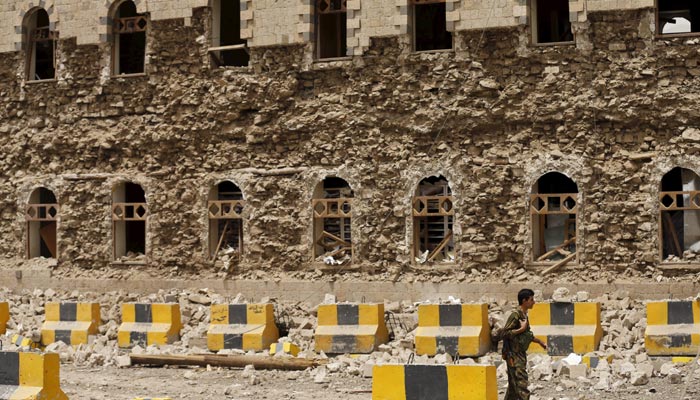A Houthi militant walks in front of a building of the Defence Ministry compound damaged by a Saudi-led air strike in Sanaa on Wednesday.
Reuters/Aden
At least 43 people were killed in heavy fighting in Yemen overnight and on Wednesday between supporters of exiled President Abd-Rabbu Mansour Hadi and the country's dominant Houthi group, residents, tribal and medical sources said.
The clashes erupted ahead of UN-sponsored talks in Geneva next week aimed at ending a conflict that has drawn in Saudi Arabia and some of its allies on one side and the Iranian-backed Houthis and former president Ali Abdullah Saleh on the other.
Residents and fighters said fighters opposed to the Houthis advanced from a district of Aden known as 'workers' island' towards the port city's Houthi-held international airport. They said five local fighters and 11 Houthis had died in clashes.
Eight fighters from an anti-Houthi force called the Southern Resistance were also wounded in the clashes, they said.
Residents said warplanes from a Saudi-led coalition flew sorties overnight against Houthi outposts in the Bir Ahmed area north of Aden, killing 12 members of the Zaydi Shia Muslim group.
Saudi-led air strikes on Houthi fighters in the oil-producing Marib province also killed 10 Houthis, tribal sources told Reuters. Separately, in the central city of Taiz, medical sources said five civilians had been killed when they were caught in the middle of fighting between the Houthis and local resistance fighters aligned with Hadi.
Representatives of Hadi's government are scheduled to begin talks in Geneva with representatives of the Houthi group and Saleh's General People's Congress party on Sunday, amid reports of disagreements about the agenda.
Sizzling temperatures
Mohammed Abdel-Salam, spokesman for the Houthi group, said late on Tuesday that their representation at the conference was still under discussion and had yet to be finalised.
Hundreds of thousands of people have been displaced by the fighting in Yemen, which escalated sharply after Saudi-led Arab forces waded into the conflict in March to try to shore up Hadi and stop the Houthis advancing on areas held by his supporters.
Iran and the Houthis deny having any military or economic links. The Houthis say their seizure of the capital Sanaa in September and their advance south is part of a "revolution" against a corrupt government.
Humanitarian conditions have deteriorated sharply, with shortages of fresh produce, poultry, flour, fuel and other basic needs. Residents also complain that uncollected garbage, rotting under sizzling temperatures of nearly 50 degrees Celsius in Aden, has caused the spread of disease such as dengue fever.
Some report dozens of deaths among the Houthis, who come from a highland region of Yemen and are unaccustomed to high temperatures, but the reports could not be immediately be verified by medical experts.

